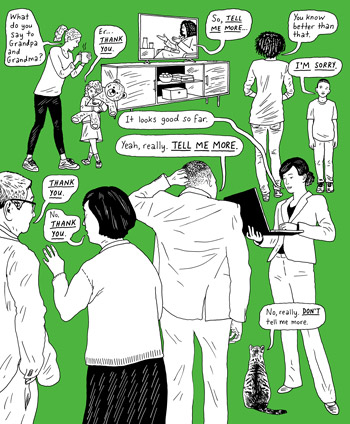
Illustration by Peter Arkle
Amanda, wide-eyed and ecstatic, doesn’t notice it’s 5:47 a.m. but wakes Mom and Dad up. What would you expect from a six-year-old on Christmas morning? Then Grandpa and Grandma arise from sleep amid all the commotion, as does Amanda’s brother, Jimmy, and everyone makes their way down to the Christmas tree and the massive number of presents. With permission granted, Amanda decides to open the big box from her grandparents. Paper flies everywhere, ribbon is tossed aside, and she finally finds the toy she’s been asking for since summer. With shouts of excitement, she proceeds to open the box and remove the various pieces.
“What do you say to Grandma and Grandpa?” says Mom. “Thank you,” mumbles Amanda, not even turning her head to look at the givers of the gift.
A few hours later in the day, Amanda’s emotions have turned from ecstasy to agony. She comes screaming into the kitchen, doubled over in apparent pain. “Jimmy punched me in the stomach,” she blurts out between sobs. “Jimmy!” yells mom. “Come to the kitchen.” Jimmy, with an aura of eight-year-old assertiveness, starts speaking before he’s even in sight. “But she pushed me first.” As Jimmy enters the room, Dad makes him stand in front of Amanda. “What do you say to your sister?” In an almost inaudible voice, with no hint of contrition and an inner conviction that he will do it again given the first opportunity, the words come out: “I’m sorry.”

Illustration by Peter Arkle
That evening, 15-year-old Olivia returns from visiting her dad. It’s the first Christmas Day she has spent away from her mom, stepdad, and stepsiblings. Everyone is excited to see her when she arrives, but she has interrupted their board game, so there’s little conversation. Mom asks how her time went, and Olivia begins with the usual teenage brevity: “Fine.” On his way into the kitchen to get coffee, Dad says, “Tell me more,” but Olivia has already gone down the hallway toward her room, and he’s in a hurry to get back to the game. Connection missed.
“Thank you.”
“I’m sorry.”
“Tell me more.”
Most of us link these three phrases with good manners. We assume that’s their sole purpose. Rearing children to be well-behaved, or at least to appear that way, will come about if they learn to repeat “Thank you,” “I’m sorry,” and “Tell me more” with frequency.
But what if these three phrases could change the world? With all its challenges, problems, tensions, and difficulties? As moms and dads, we believe that saying “Thank you,” “I’m sorry,” and “Tell me more” will help our children become better people, friends, partners, employees, neighbors, and global citizens. Manners are a foundation for navigating our connection with others. But we need more than manners.
During elementary school recess, teachers are helping children learn to play with others. High school parents are vigilant in watching their sons’ and daughters’ relationships. High-quality romantic connections require the ability to interact well. Almost every workplace expects employees to connect well with coworkers, clients, and customers. Living next door to someone from another country, race, or faith is an invitation to be hospitable and engage. Being a congresswoman, senator, president, prime minister, member of parliament, or community advocate offers you the privilege and responsibility to interact helpfully with multiple people.
Can you imagine a world where we didn’t need to journey with others? Some of us do have those fantasies. Feeling the burden of “the other” can be exhausting. A life-withering partner. An energy-consuming child. An exasperating family member. An irritating coworker. A frustrating neighbor. An annoying politician. We would love a world where it was just us. In communion with ourselves and no one else, we wouldn’t have to deal with “the other.”

Illustration by Peter Arkle
The reality, in the non-fantasy world, is different. Every day people impact us, whether in the home, on the road, at work, or simply watching the news. And we impact others – by what we do and say, as well as by what we don’t do or say. And we impact each other. The more we pretend we don’t have influence on one another, the more deeply entrenched cultural norms keep us from truly seeing one another.
Although manners may be a starting point on the journey of how to relate, the three phrases take on new meaning when you begin to reflect on our daily journey with “the other.”
If we say “Thank you,” we’re acknowledging the way others impact us. If we say “I’m sorry,” we’re acknowledging the way we impact others. If we say “Tell me more,” we’re acknowledging the way we impact each other.
Think of these three statements as one way to assess the relational quality of journeying with others. How frequently do my wife, daughter, co-workers, and close friends hear me say “Thank you,” “I’m sorry,” or “Tell me more”? The world is a better place when political, religious, and public-square leaders – and the rest of us – have a way of being that acknowledges others’ mutual impact.
This article is excerpted from Thank You. I’m Sorry. Tell Me More: How to Change the World with Three Sacred Sayings, by Rod Wilson, Ph.D. It was published in January 2022 and is used by permission of NavPress. All rights reserved. Represented by Tyndale House Publishers, a division of Tyndale House Ministries.




























